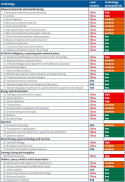A lot of China's growth in the past few decades is catch-up growth or in the economic literature "convergence".If China can achieve successful growth when US had overwhelming economic advantages, why can't the US also achieve healthy growth with a strong China? I find this type of black or white thinking unrealistic. I believe both economies will eventually learn to work with whatever economic balance they arrive at.
To oversimplify: in order to produce anything, you need labor, capital, and technology. Specifically, with labor: it is the number of hours worked, accumulated education and experience and the number of workers. With capital: it takes on a "human capital" form of education/experience, physical capital of the infrastructure/buildings/machines and intangible capital such as software. With regards to technology: it is anything that increases the ability to use the same units of labor and capital to produce more output, be it management processes, scientific breakthroughs, good governance, etc.
With high-income countries (such as the United States), growth in labor and capital is much slower -> going from 0 computers to 1 computer causes a substantial increase in productivity, going from 1 computer to 10 computers does not increase productivity substantially so nearly all growth comes from discovering new technology and diffusing that throughout the economy; in low and middle-income countries (such as China), substantial growth can come from the labor term -> moving individuals through school and from the rural areas doing subsidence agriculture to higher productivity manufacturing/services, the capital term -> using accumulated savings to finance machines/infrastructure/urbanization/buildings/etc, and the technological term -> adapting the ways that is done in other more productive countries and as a result, is capable of growing much faster.
Poorer countries have the potential to grow faster than wealthy countries (otherwise known as unconditional beta-convergence) but this is often not realized: one way that this is controlled for is with conditional beta-convergence (poorer countries or regions with similar governance mechanisms will grow faster than wealthier countries/regions with similar governance mechanisms). Evidence of this comes from both observations of economic growth since the 1940s of OECD countries and from within-country regional growth patterns (for example: poorer states in the United States tend to grow ~2% faster than wealthier states; poorer provinces in China also tend to grow faster than wealthier provinces in China; etc).
The tl;dr is that a substantial amount of growth in China is catch-up growth and that as a result, the expectation should be for China to grow faster than the United States but those growth differentials should narrow over time as China approaches the technological frontier (and that has largely been observed over the last decade when China's growth has slowed but is still very fast)

